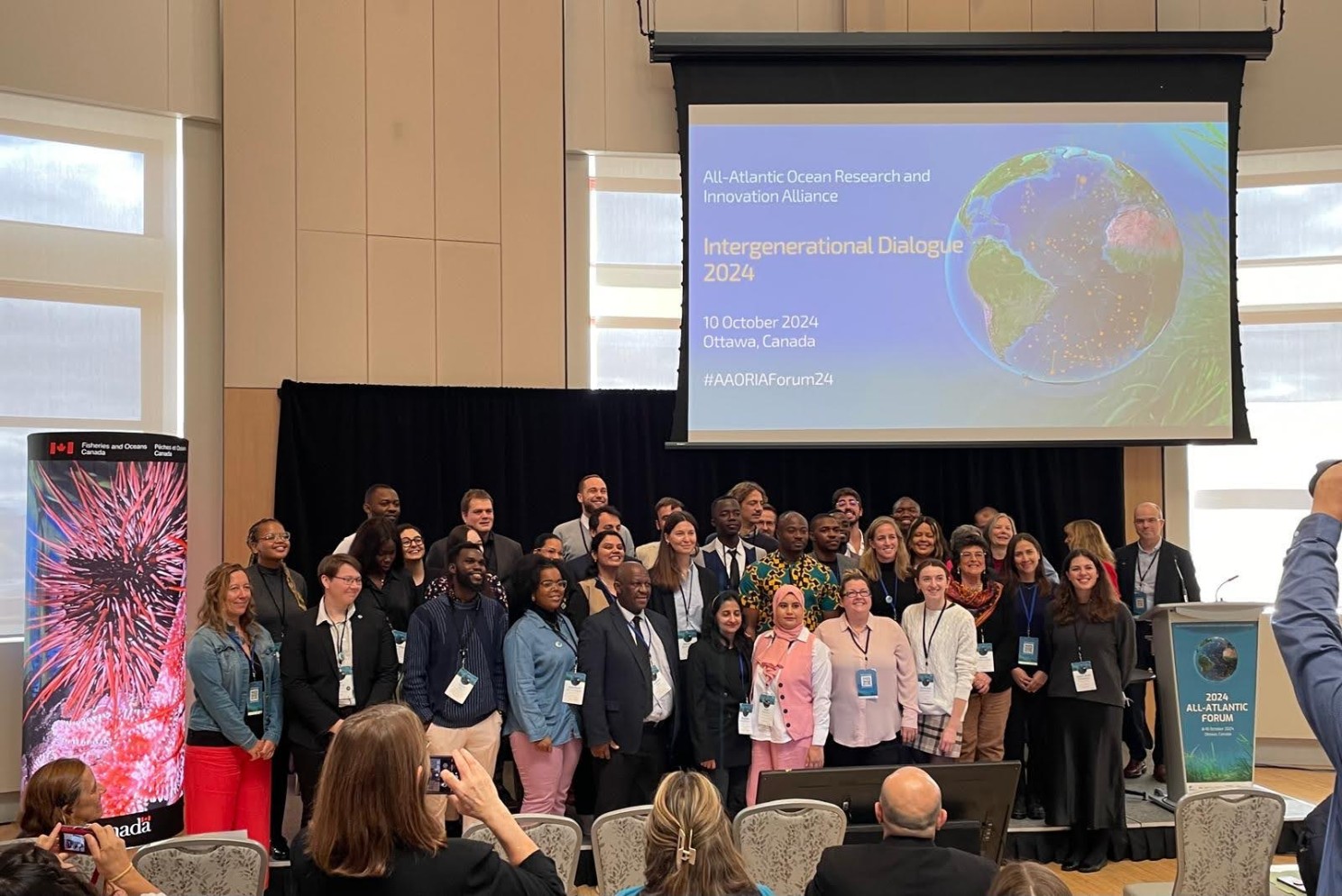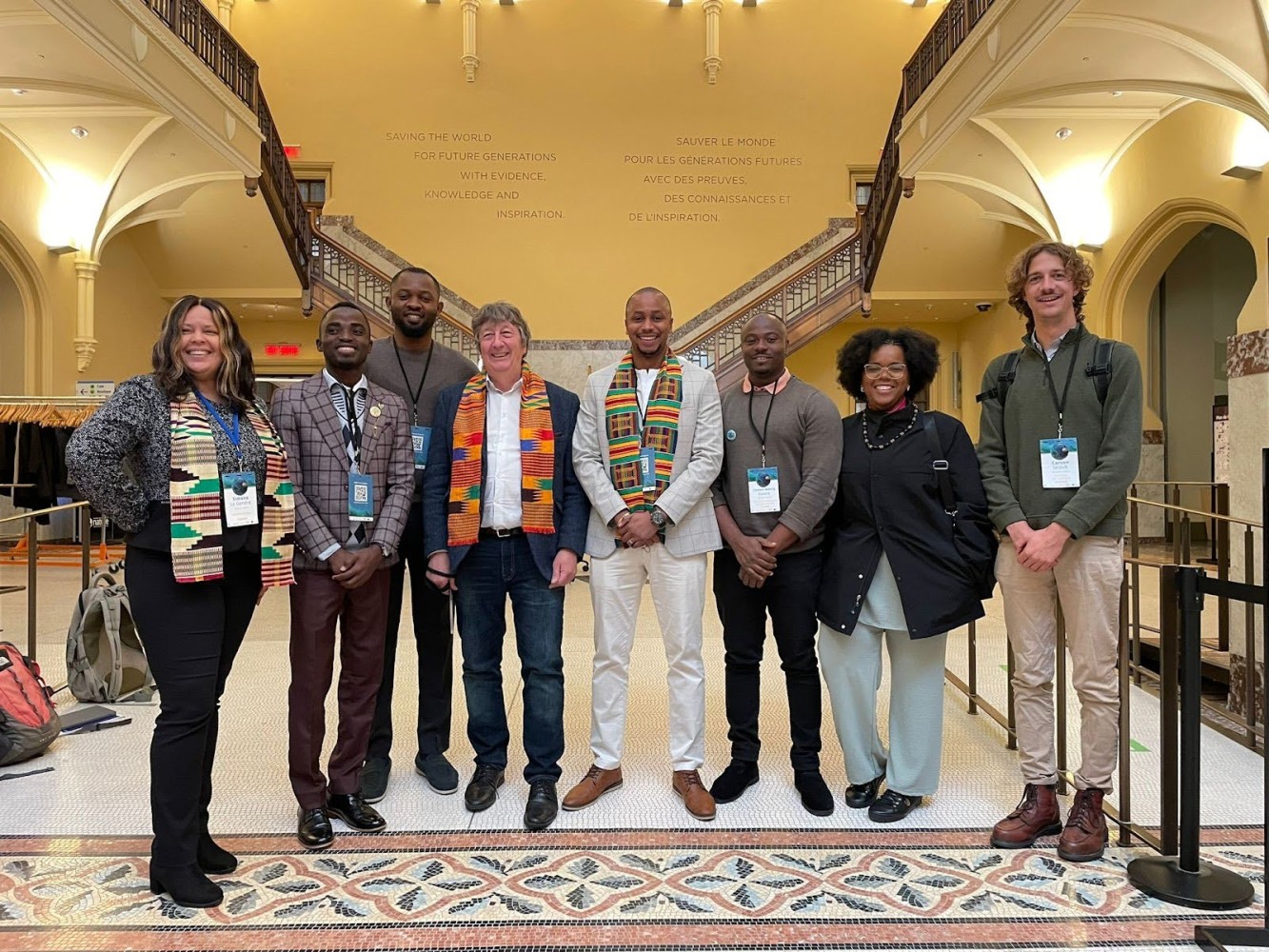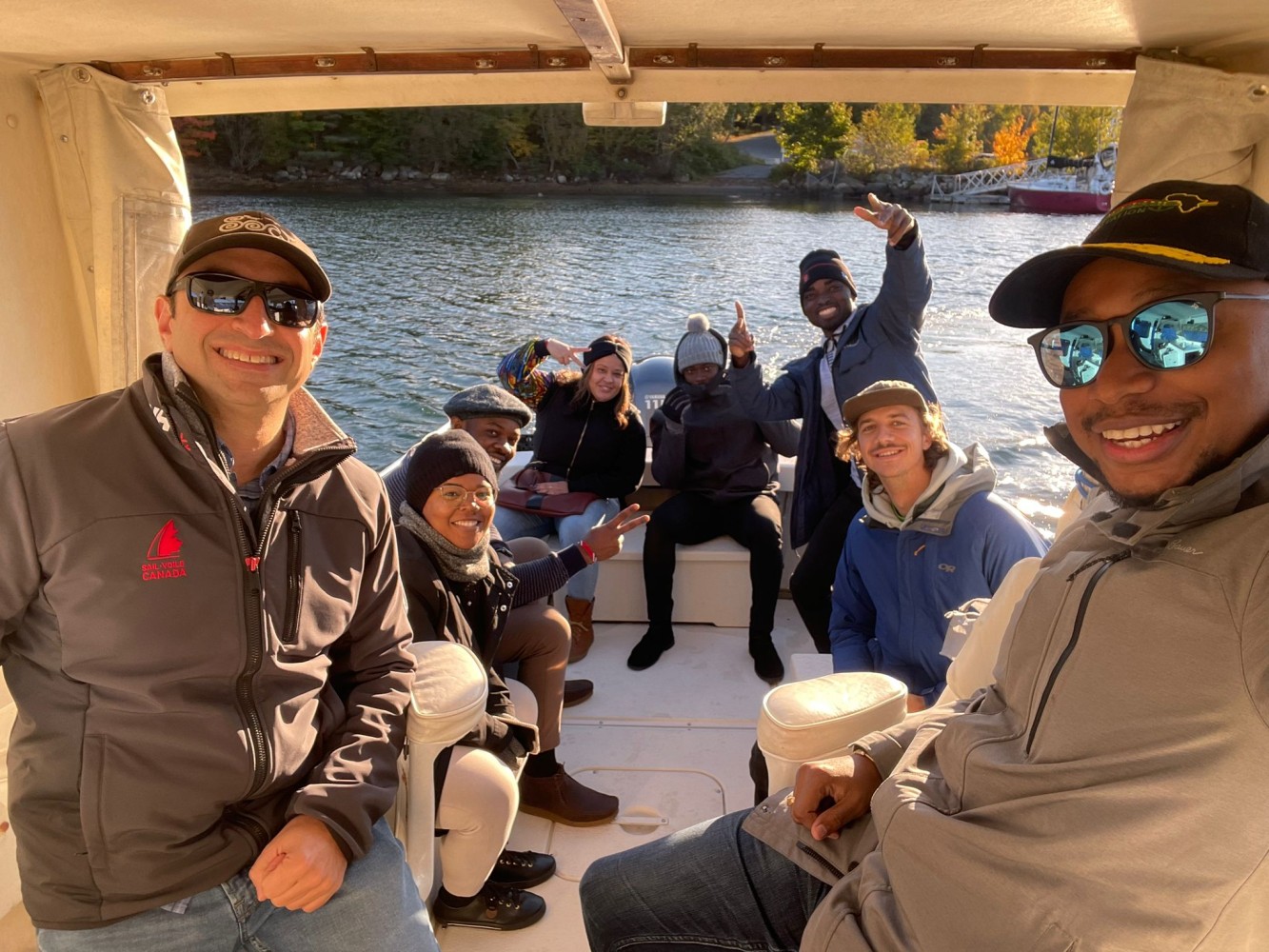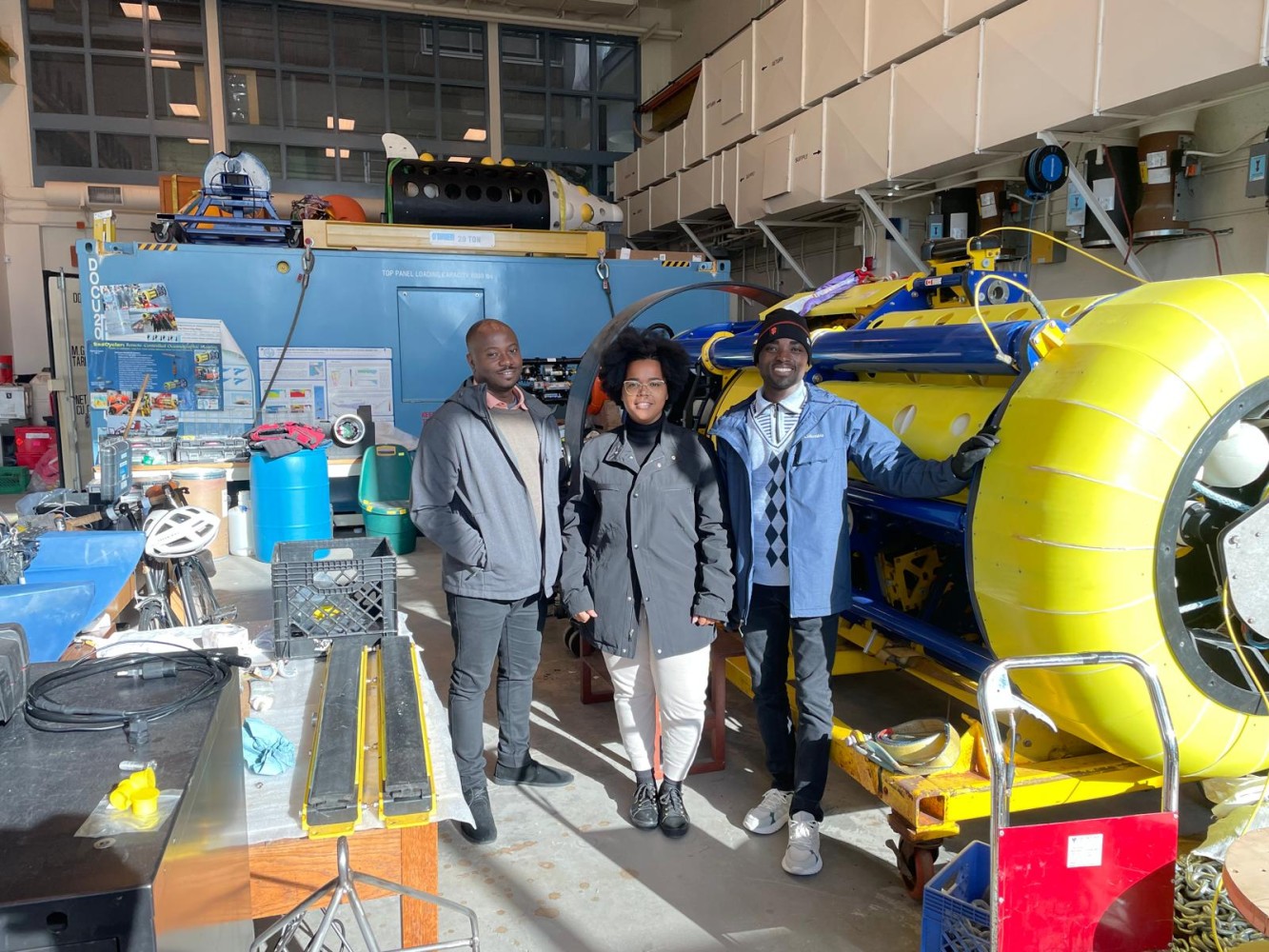How funding can empower diverse perspectives & drive meaningful change in the global ocean conversation.
Meaningful change in the global blue economy can only come through collaboration – from diverse perspectives, sitting around the same tables, sharing knowledge and driving collective action on behalf of the ocean. But for many, the opportunity to participate in a shared global ocean conversation is out of reach. Whether it’s due to a lack of access to opportunities, resources or funding, the global ocean conversation is often siloed when it needs to be open.
It is with a mind to breaking down borders and opening up opportunities to bring a diversity of perspectives to the global ocean conversation that relevant funding has a big role to play.
A recent and close-to-home example of the impact that funding can have for the ocean comes from three West African students who had the opportunity to attend the All-Atlantic Ocean Research and Innovation Alliance(AAIORIA) workshop held in Ottawa earlier this year.
“As a young Cabo Verdean woman, attending this forum was a dream, not so easy to realize, as the one-week forum turned into three weeks away from home. I had to travel to Senegal for visa procedures and then directly to Canada,” shared Katelene Da Cruz Delgado, a workshop attendee and member of the Woman & Youth Technical Capacity for the Blue Economy (WYTEC Blue) training program.
“But I can say it was worth it. I had the pleasure of sharing some of my experiences working on coastal community co-management as a panelist during the side event ‘Towards an All-Atlantic Coastal Resilience Interface.’ I networked with ECOP [Early Career Ocean Professional] and senior experts and learned about projects and programs from different parts of the Atlantic coast. This experience made me realize that it is worth working for real impact.”
"This experience made me realize that it is worth working for real impact.”
WYTEC Blue is a program run by the Development of Ocean Technical Capacity with African Nations (DOTCAN Institute), an organization that seeks to open doors between West Africa and Canada by addressing challenges and providing opportunities that set students up for long-term success, ultimately resulting in a healthier and more sustainable future for oceans.
Funding provided by the Government of Canada through its Strategic Science Fund (SSF)program via MEOPAR (Marine Environmental Observation Prediction and Response Network) made it possible for three West African trainees from DOTCAN’s WYTEC Blue program – two from Ghana and one from Cabo Verde – to travel to Canada for the first time and attend the AAIORIA workshop in Ottawa and subsequent meeting in Halifax afterwards.
“The testimony from participants is why we are confident that this forum attendance had a strong impact on their personal and professional perspectives, not only concerning ocean-related challenges and opportunities but also concerning the importance of international collaboration, networking and friendship building,” said DOTCAN Executive Director, Debany Fonseca Batista. “We expect this will have a positive impact on their professional development and expand the role they can play not only in their local communities and home countries, but also within their regions and way beyond, while contributing to building trans-Atlantic connections.”
"It was a transformative experience"
The AAIORIA workshop provided students with an invaluable chance to make international connections, participate in shared knowledge exchange and work to translate their unique perspectives into global ocean action.
“It was a transformative experience that provided an exceptional platform to engage with experts and industry professionals, share perspectives, and exchange ideas on innovative approaches, as well as participate firsthand in exercises bridging the gap between research and practice, by translating science into action,” said Clement Babong Kwara, one of the Ghanaian trainees who was able to attend.
The outcome of the AAIORIA workshop demonstrates the value of the contribution of diverse perspectives to the global ocean conversation and inspires hope for collective ocean action going forward.
Although there is work still to be done to continue to foster interconnectivity between West Africa and Canada, the AAIORIA workshop is a prime example of how targeted funding can break down barriers and open doors for a more inclusive global ocean conversation.
Comment le financement peut promouvoir la diversité des points de vue et catalyser des changements significatifs dans le dialogue mondial sur l’océan
Étudiants de DOTCAN en Afrique de l’Ouest et l’atelier de l’Alliance atlantique pour la recherche et l’innovation océaniques.
Un changement durable dans l’économie bleue mondiale ne peut émerger qu’à travers une collaboration authentique : rassembler des perspectives variées autour d’une même table, partager des savoirs et mener des actions collectives en faveur de l’océan. Pourtant, pour de nombreux acteurs, accéder à ce dialogue mondial reste un défi majeur. Le manque d’opportunités, de ressources ou de financements cloisonne souvent les discussions qui, pourtant, devraient être accessibles à toutes les voix.
C’est dans cette optique que le financement ciblé joue un rôle essentiel : il permet d’abattre les barrières et de favoriser l’intégration de perspectives diversifiées au sein du dialogue mondial sur l’océan. Un exemple récent et concret de l’impact de ces financements nous provient de l’expérience de trois étudiants ouest-africains ayant eu l’opportunité de participer à l’atelier de l’Alliance de Recherche et d’Innovation de l’Océan Atlantique (AAIORIA), tenu à Ottawa plus tôt cette année.
« En tant que jeune femme capverdienne, participer à ce forum était un rêve, mais sa réalisation n’a pas été simple », témoigne Katelene Da Cruz Delgado, membre du programme de formation Woman & Youth Technical Capacity for the Blue Economy (WYTEC Blue).
« Ce qui devait être une semaine de forum s’est transformé en trois semaines loin de chez moi. J’ai dû me rendre au Sénégal pour les démarches de visa avant de rejoindre le Canada. »
Malgré ces défis, l’expérience a été profondément enrichissante :
« J’ai eu l’opportunité de présenter mon travail sur la cogestion des communautés côtières en tant que panéliste lors de l’événement parallèle intitulé Vers une interface de résilience côtière pour l’ensemble de l’Atlantique. Cette participation m’a permis de tisser des liens avec de jeunes professionnels de l’océan (ECOP) et des experts chevronnés tout en découvrant des initiatives menées dans d’autres régions de la côte atlantique. Cette expérience m’a confirmé qu’il vaut vraiment la peine de travailler pour avoir un impact concret sur le monde. »
« Cette expérience m’a confirmé qu’il vaut vraiment la peine de travailler pour avoir un impact concret sur le monde. »
Le programme WYTEC Blue, dirigé par l’organisation Development of Ocean Technical Capacity with African Nations (DOTCAN), vise à renforcer les liens entre l’Afrique de l’Ouest et le Canada. En apportant des solutions aux défis rencontrés par les étudiants et en leur offrant des opportunités de développement, ce programme contribue à construire un avenir plus durable pour les océans.
Grâce au financement fourni par le gouvernement du Canada via le programme Strategic Science Fund (SSF) et en partenariat avec MEOPAR (Marine Environmental Observation Prediction and Response Network), ces trois étudiants — deux originaires du Ghana et une du Cap-Vert — ont pu voyager pour la première fois au Canada, participer à l’atelier de l’AAIORIA à Ottawa et assister à une réunion subséquente à Halifax.
« Les témoignages des participants confirment que leur participation à ce forum a eu un impact significatif sur leurs perspectives personnelles et professionnelles, non seulement sur les défis et opportunités liés à l’océan, mais aussi sur l’importance de la collaboration internationale, du réseautage et de la création de liens durables », a déclaré Dr Debany Fonseca Batista, directrice exécutive de DOTCAN.
« Nous prévoyons que cette expérience aura des retombées positives sur leur développement professionnel et élargira le rôle qu’ils peuvent jouer, non seulement dans leurs communautés locales et leurs pays d’origine, mais également à l’échelle régionale et internationale, tout en renforçant les connexions transatlantiques. »
L’atelier de l’AAIORIA a offert aux étudiants une opportunité précieuse de tisser des liens internationaux, de participer à un échange de savoirs et de travailler à transformer leurs perspectives uniques en actions concrètes pour la préservation des océans.
« Ce fut une expérience transformatrice qui m’a fourni une plateforme exceptionnelle pour collaborer avec des experts et des professionnels du secteur, partager des idées et explorer des approches innovantes. J’ai également eu l’opportunité de participer directement à des exercices visant à combler le fossé entre la recherche et la pratique, en traduisant la science en action », a déclaré Clement Babong Kwara, l’un des stagiaires ghanéens présents à l’atelier.
Les résultats de l’atelier de l’AAIORIA mettent en lumière l’apport essentiel des perspectives diversifiées dans le dialogue mondial sur les océans. Ils nourrissent également l’espoir d’une action collective renforcée pour la préservation de l’océan.
Bien qu’il reste du travail à accomplir pour renforcer l’interconnexion entre l’Afrique de l’Ouest et le Canada, l’atelier de l’AAIORIA constitue un excellent exemple de la façon dont un financement ciblé peut surmonter les obstacles et ouvrir la voie à un dialogue mondial plus inclusif sur la conservation de l’océan.





